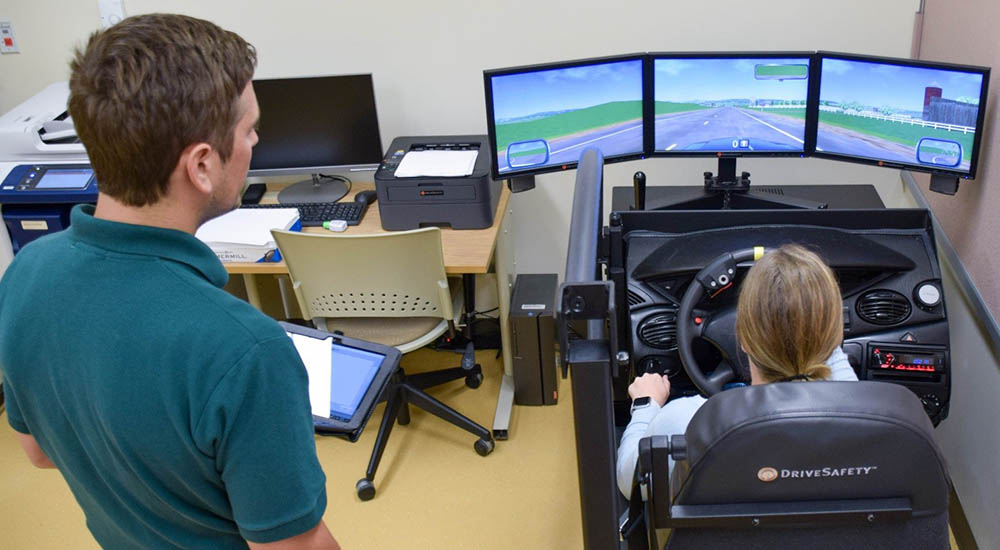Kinesiotherapy (KT) is a rehab profession that provides therapeutic exercise and holistic interventions to improve well-being and functional abilities. It has been used to help Veterans on an ongoing basis since WWII. Today, VA is the single largest employer of kinesiotherapists (KTs), treating more than 100,000 Veterans in Fiscal Year 2019.
During recent challenges, KTs quickly shifted necessary outpatient evaluations and treatments to virtual care. This ensured Veterans’ safety while also providing specialized rehabilitation for inpatient Veterans requiring extended physical reconditioning.
KTs across the VA health care system today are educated and specialty trained at the undergraduate and graduate level. They support the complex needs of the Veteran population by focusing on skilled rehabilitation, improved function and quality of life.

Todd Keanan, registered kinesiotherapist and certified driver rehabilitation specialist, uses VA Video Connect (VVC) virtual technology to evaluate Veterans living in Jacksonville to recommend adaptive driving equipment for a new vehicle. It saves Veterans costly travel time. (2019 photo)
Their unique holistic approach involves the Veteran as well as their family and caregivers. They emphasize the psychological, as well as physical, benefits of therapeutic exercise within acute, post-acute, outpatient and home-based rehabilitation services. They also provide health and wellness coaching, disease prevention and comprehensive whole health practices.
In use since World War II
KT first was used during WWII when KTs implemented whole health therapy to accelerate the return of soldiers to active duty within physical reconditioning units established by the U.S. Armed Forces.
Pictured above, Abraham Hancock, registered KT and certified driver rehabilitation specialist at the Tampa VA, oversees the KT driver rehabilitation clinic’s simulator. It provides the Veteran and the clinician feedback before progressing to on-the-road instruction with adaptive driving equipment. (2019 photo)
Determination for appropriateness for driver rehabilitation evaluations utilizing VA Video Connect (VVC) technology is always made on case-by-case basis. When the Veteran is well known to the therapist from previous on-road assessments and the Veteran’s Primary Care Physician has documented medical clearance with no cognitive, visual or physical changes that would require a face to face evaluation, the Veteran is a good candidate for VVC.
Observing drivers with Video Connect
Using VVC, Keanan can observe Veterans transfer safely into their vehicles. He sees them stow their wheelchairs and demonstrate basic operational controls (such as making turns and using gas/brake) in a parked position.
The Veteran does not have to come in-person to the VA hospital for the KT Driver Rehabilitation Clinic outpatient appointment to make recommendations for the same adaptive equipment to be placed in a new vehicle. This also applies to the final fittings and inspections once the adaptive equipment was installed.
VA celebrates the profession of Kinesiotherapy and the KTs who are dedicated to the health and wellbeing of our service members and Veterans.
For more information on VA KT, please visit www.rehab.va.gov/KT/ and inquire about KT services within your local VA facility Physical Medicine and Rehabilitation Service.
Diane J. Waller is a rehabilitation planning specialist and coordinator for the National Physical Medicine and Rehabilitation Program Office. That office lies within Rehabilitation and Prosthetic Services in VA Central Office.
Kathy Camp is the executive director of the American Kinesiotherapy Association.
Topics in this story
More Stories
Study underscores important role COVID vaccination can have in protecting Veterans from infection and reducing long-term health consequences
Columbia VA’s robotic surgery teams completed their 800th robotic surgery and are on schedule to hit 1,000 by the end of the year.
In a decentralized clinical trial, Veterans can participate from their own homes or local VA instead of having to travel to a research site.






